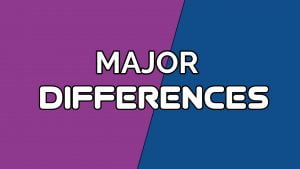Meaning, functions and Difference between a teacher and a lecturer: The terms teacher and lecturer are similar and often erroneously used interchangeably. Both teachers and lecturers are educators. The main aim of teaching is educating students; therefore, teachers and lecturers play a crucial role in the educational field.
Who is a teacher?
A teacher, sometimes called a school teacher or an educator, is a person who helps others acquire knowledge, values and competences whether formally or informally.

Informally, a teacher is anybody outside the formal education environment, that is, school, who helps another learn. This person could be a relation, neighbor or friend. Most times, they are the families of the student.
Formally, teachers are paid professionals that work in a school; they are usually called “school teachers”. In this article, the teachers we are going to focus on are the school teachers.
A teacher is a person who educates students in a school. This deals with primary and secondary education. Hence, a teacher usually teaches students who are aged from 4 – 18. To teach, teachers need a teaching certification or qualification from a college or university. Bachelors degree in the related subject also counts as a qualification.
Also, a teacher must be a good listener, as to teach, you must first listen; listen to the needs of the student, listen and notice the way of learning of the child and choose a teaching methods and pace that would be efficient and useful in imparting knowledge to the students. Teachers play a crucial role in shaping the lives of young people. Teachers act as role models, mentors, advisers and caregivers. Basically, teachers impart knowledge to their students to help them learn new things about a specific group of subjects.
RECOMMENDED: Meaning, features, advantages and disadvantages of a rigid constitution
Roles and responsibilities of a teacher
The roles of teachers are expansive. Teachers are no longer seen as mere classroom educators that just teach core subjects to a classroom full of students and go home for the day, they work across a variety of subjects which they may bring to life with the assistance of modern technologies. A teacher shapes the life chances of young people by imparting knowledge and bringing the curriculum to life. Teachers impart knowledge, safeguard the welfare of the children, inspire critical thinking, thoughts, and moral values.
The duties of a teacher include:
a. Teaching students in accordance with the curriculum
b. Planning, preparing and delivering lessons within the required time.
c. Building an all- round student, by inculcating the important of extra-curricular activities.
d. Supporting the school leadership team, and making plans as to ensuring high level of production amongst the students.
e. Assessing, documenting, and reporting the behavior of students.
f. Providing educational and social guidance to students.
g. Becoming a mentor and providing mentorship for students in need of guidance.
h. Ensuring the standard and quality of education received is the highest possible education a student could be given.
I. Taking part in opportunities to boost their (teacher) own learning and continuous professional development.
J. Attending and taking part of meetings to support the smooth running of the school.
k. Collaborating with parents, guardians, support workers, care givers, and other professionals to safeguard and ensure the educational welfare of statement students who may have special educational needs.
l. Contacting the parents of students regarding their progress. Where the students are not doing well as they should, they should seek for change of environment or tactics on the part of the parents and also remove any hindrances to the child’s development.
Some necessary skills to become a teacher include:
Strong written and verbal communication skills.
Strong knowledge of the subject being taught.
Organizational skills and the ability to juggle many simultaneous projects and administrative tasks.
Numerical and literacy skills.
Emotional intelligence and resilience.
The ability to interpret the behavior of children and judge when something may be wrong or when they require extra help.
Kindly watch the video below for a better understanding of who a teacher is. Trust me; you will learn a lot by watching.
RECOMMENDED: How to answer law problem questions using IRAC Method
Who is a Lecturer?
A lecturer is a person holding an open-ended, tenure-track or tenured position at a university. In some countries, the term describes any academic expert without tenure that may be hired on a full time or part time basis. The title typically requires a doctorate or an equivalent degree. Lecturers are subject experts employed by universities and higher education establishment duties within a specialist area.

They create course material, lesson plans, and curricula, conduct research and fieldwork, engage with students, assist with processing applications, attending interviews, conferences, and meetings. Lecturers work long hours, including evenings and weekends because of the requirement to publish research work and general commitment to the job.
The job of a lecturer should contain a variety of functions and roles including:
a. Preparing and delivering lectures, workshop, tutorials and seminars.
b. Developing curricula and course material that can be used across a number of platforms.
c. Participating in training opportunities and initiatives at the institution.
d. Providing support to students and other colleagues, especially to students in need of mentors.
e. Staying current by reading widely and producing published work in the field, This is in order to have the capacity to teach the students based on the evolving matters of society and provide up to date information to the students.
f. Setting, reading and grading assignments, tests and exams.
g. Conducting research, and writing papers, proposals, journal articles, and books.
h. Attending and participating in meetings, conferences, and other events in and outside of the institution.
I. Skills and qualifications necessary for being a lecturer include:
J. An M.sc or Ph.D. in the relevant discipline.
k. Previous teaching experience.
l. Published work would be an added advantage.
m. Strong interpersonal, presentation and written and verbal communication skills.
n. Flexibility, resilience, and willingness to work long hours, without grudge as the understanding of the courses by the students are of utmost priority.
For the dictionary meaning of who a lecturer is, I enjoin you to what the video below. Trust me you will learn from it.
Also see: Differences between a deed and an agreement
Differences between a Teacher And a Lecturer
There are a lot of differences between a teacher and a lecturer and they include:

Place of work: a teacher works at primary and secondary schools whereas a lecturer works at universities and higher institutes of learning.
Students: Teachers teach children that are likely to fall between the age group of 4 – 18, while lecturers teach adults or students who have finished cum graduated from high school.
Research: Research is not a primary role of a teacher but it happens to be a basic duty for a lecturer, as the teacher basically teaches mostly professional course, courses that impact on the society at large.
Educational qualifications: to qualify as a teacher, an education certification or a bachelor’s degree is sufficient. However, for lecturers, it is necessary to have post graduate qualifications and research experience.
Type of education: teachers are involved in primary and secondary education while lecturers are involved in tertiary educations.
Salary: A teacher is usually paid lower than is paid in most occupations. Hence the saying, “teaching is not a job you do for the money”. This is the general rule, and it applies to both teachers and lecturers. However, in relation to lecturers, teachers are often paid way lower than lecturers. This is of course depended on the community, environment and the type of school.
A teacher is responsible for the primary education of an individual. When the primary education ends, a lecturer becomes responsible for the educating of the individual at a tertiary institution.

Edeh Samuel Chukwuemeka, ACMC, is a lawyer and a certified mediator/conciliator in Nigeria. He is also a developer with knowledge in various programming languages. Samuel is determined to leverage his skills in technology, SEO, and legal practice to revolutionize the legal profession worldwide by creating web and mobile applications that simplify legal research. Sam is also passionate about educating and providing valuable information to people.